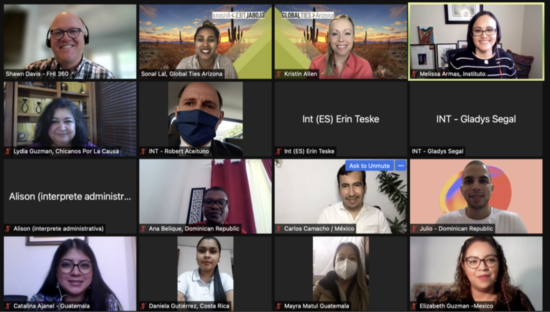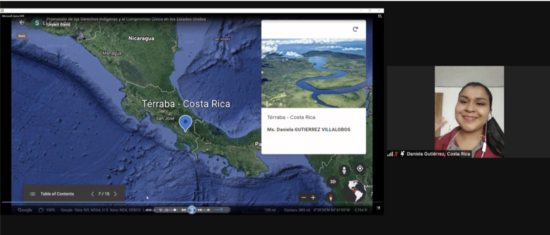By Sonal Lal, Program Coordinator, Global Ties Arizona

Photo provided by Global Ties Arizona
When you think about inviting someone into your home city, state, and country, what aspects of your community do you share? Is it the food, the history, or something else? Maybe it’s a combination of several things.
If you asked me why someone should visit Phoenix, AZ, I would first highlight its diversity. Arizona is home to 22 federally recognized tribes, including the largest reservation in the country: the Navajo Nation. And as a border state to Mexico, more than 30% of Arizonans identify as Hispanic, according to the U.S. Census Bureau (2020). Demographic and linguistic diversity is only one part of Arizona’s identity. Arizona’s economy supports both local and international businesses, investments, and trade, although most of Arizona is still experiencing some level of drought, it’s almost guaranteed to be “postcard perfect” somewhere in the state.
These are some of the things that makes Arizona “Arizona.” Through international exchange, we facilitate dialogue that uncovers differences and similarities with other communities across the world, ultimately paving way for new and exciting opportunities to teach and to learn from one another; to affirm our progress while critically examining our approach; to connect authentically and/or to disagree respectfully; and to, ultimately, engage willingly and collaboratively with one another, across the world.
In October 2021, Global Ties Arizona had the pleasure of virtually hosting eight emerging leaders, hand-selected by U.S. Embassies in Costa Rica, the Dominican Republic, Guatemala, and México, to participate on the International Visitor Leadership Program (IVLP), the U.S. Department of State’s prestigious professional exchange program. The IVLP was organized with FHI 360 and focused on “Minority Participation in the Democratic Process.”
At the beginning of each meeting, Shawn Davis (IVLP Project Manager at FHI 360) and I, implemented a new method of introducing ourselves, our guest speakers, and the IVLP delegates to one another using Google Earth. The goal was to highlight each person’s place of belonging both visually and geographically using the interactive platform, and shed light to the reality that our “Zoom box” only captures a fraction of who we are and where we have been.

Photo provided by Global Ties Arizona
In their first meeting, Michelle Hale, Ph.D. (Assistant Professor of American Indian Studies at Arizona State University); Debbie Nez-Manuel (Community Leader & Activist); and Candice Joe (Intern, Phoenix Indian Center) spoke to our delegation about their roles in promoting Indigenous rights and political and civic engagement within our state.
“International exchanges allow communities to grow and learn from one another,” said Candice. “I am glad I was able to share the work being done at the Phoenix Indian Center as well as my experience as a youth in Civic Engagement. It was great to hear our other speakers’ presentations as well as learn from the audience with the incredible work they do!”
In another meeting, Melissa Armas (Operations Director, Instituto); and Lydia Guzman (Director of Advocacy and Civic Engagement, Chicanos Por La Causa) discussed strategies for increasing Latinx grassroots and political participation within the state.
Shared Melissa, “I’m grateful for the opportunity to exchange ideas with participants from Latin America, learn about their challenges and hopes, and realize that voters in our hemisphere have similar needs and dreams. The future of our region is interconnected and I’m so lucky to be included in a conversation with a global community that can build that future together.”
Added an IVLP alum from Oaxaca, México, “Thanks to Global Ties Arizona for connecting us with experiences and inspiring individuals…. [These leaders] motivate me to continue working for human rights!”
My personal experiences and my work at Global Ties Arizona convince me every day that international exchange is powerful. It highlights our shared humanity, regardless of how we identify; increases empathy and allyship around the world; encourages growth through education; transforms conflict into opportunity; and offers space to authentically connect with others through the exchange of ideas, dialogue, and collaboration. I believe that international exchange offers thousands of opportunities to better ourselves and the world in which we live.
In the words of many leaders from around the world, these are the reasons why international exchange matters and will continue to matter.
